7 herbes et épices aux puissants bienfaits pour la santé
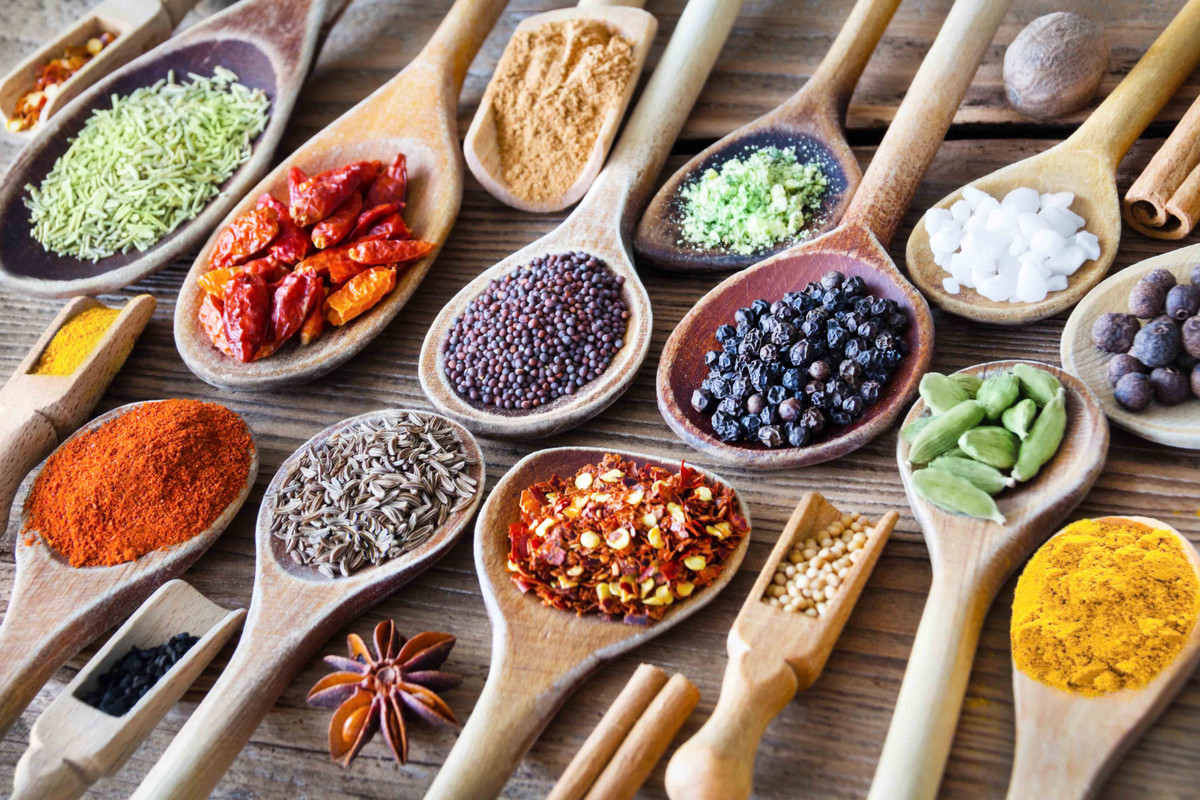
Mais l’une des sources santé les plus ignorées sont les épices et les herbes qui présentent de puissants avantages pour la santé tout en donnant de la saveur à nos plats. Aujourd’hui, nous vous faisons découvrir 7 des herbes et des épices les plus saines que vous utilisez dans chez vous.
Bien que nous ne consommions que trés peu les herbes et les épices, la consommation des epices même à petites doses peuvent être de puissants nutriments, d’antioxydants, d’agents anti-inflammatoires, de constituants anticancéreux, de vitamines, de minéraux, etc.
1. Curcuma
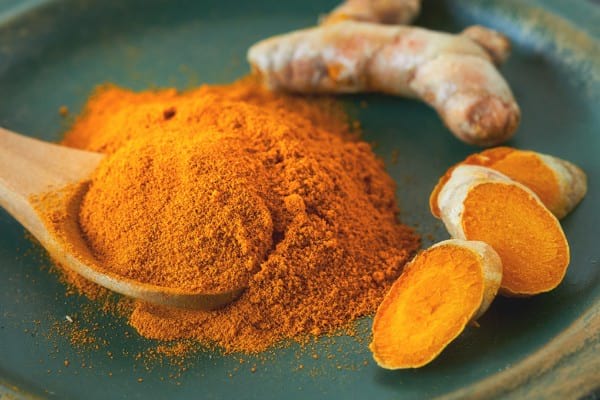
Curcuma – l’épice avec le plus d’avantages
Le curcuma est devenu un sujet brûlant dans les aliments santé et pour une bonne raison. Bien qu’il soit connu pour être ajouté à de délicieux currys, ses utilisations deviennent de plus en plus polyvalentes. Il est si facile à ajouter au régime alimentaire, ce qui facilite une implémentation d’incroyables bienfaits pour la santé facilement.
D’abord et avant tout, le curcuma combat l’inflammation. Cela peut même faire une différence significative chez les personnes qui souffrent de douleurs rhumatismales. Cela est dû à la curcumine, son constituant actif et son composé bioactif jaune, qui confère au curcuma sa couleur.
La curcumine a une grande variété d’interactions biologiques lorsqu’elle est consommée. Ses avantages anti-inflammatoires en font un bon choix pour guérir les intestins qui fuient, améliorer la digestion et traiter les problèmes auto-immunes avec des effets secondaires inflammatoires.
En raison des propriétés anti-inflammatoires de la curcumine, elle a la capacité de ralentir les processus de vieillissement et les maladies liés à l’inflammation. La curcumine est également efficace pour augmenter la capacité antioxydante du corps. C’est l’un des aliments antioxydants les plus concentrés que vous puissiez consommer! Cela signifie une réduction globale du stress oxydatif. Enfin, la curcumine peut augmenter l’immunité grâce à ses propriétés antibactériennes et antivirales, protéger contre le cancer et le développement de tumeurs et améliorer la santé cardiaque.
L’un des moyens les plus simples d’augmenter sa biodisponibilité (ou son absorption par l’organisme) consiste à utiliser du curcuma avec une pincée de poivre noir. Cela peut ne pas sembler agréable au goût, mais vous ne remarquerez probablement pas une énorme différence, en particulier dans les recettes savoureuses ou un smoothie mélangé / une boisson au lait doré. Cela est dû au poivre noir contenant de la pipérine. La combinaison peut augmenter la biodisponibilité jusqu’à 2000%
Essayez ces recettes de curcuma: mon smoothie anti-âge au curcuma et ma soupe curcuma aux courgettes et noix de coco.
2. Ginger
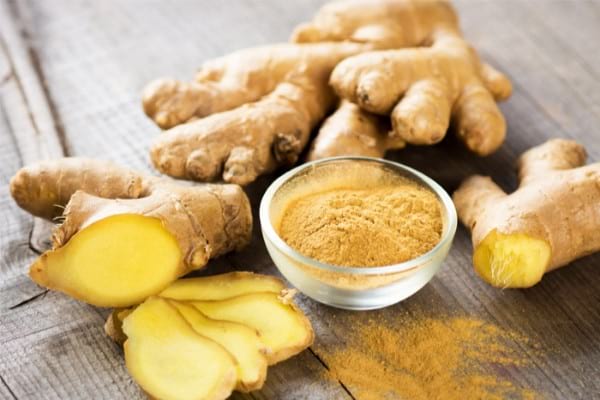
Ginger is another versatile spice that is really easy to use. Fresh ginger and ground ginger are both beneficial. You can even use ginger essential oil. I especially like to use it brewed in teas. It’s commonly known as a powerful remedy for an achy belly, but its benefits extend far beyond that. For me, ginger is often a part of my daily routine. Did you know it’s closely related to turmeric?
Like turmeric, it’s also anti-inflammatory. This is why it’s so soothing for an upset stomach which can often be traced to a root cause of inflammation somewhere down the line. Ginger can decrease markers of inflammation such as C-reactive protein.
Additionally, ginger can protect against stomach ulcers and treat menstrual cramps. It can also relieve nausea and diarrhoea. Ginger tea is great for relieving flu symptoms as well.
Raw ginger is relatively high in minerals like potassium, copper, manganese, magnesium, niacin, phosphorus, and iron. Compared to other spices, it’s easier to get a substantial amount of vitamins from ginger because you can use the raw root which provides the most bioavailable source of these minerals. In terms of vitamins, you can get a vitamin B6 and vitamin C boost from the ginger. This may be why it’s so great for immunity.
3. Cinnamon

Cinnamon is another spice I find quite easy to use and lucky for me, it’s slightly sweet and pretty darn good for you.
I love its versatility and try to use it in savoury recipes as well. I especially love the ease of sprinkling some on raw or baked fruit for a healthy dessert or having some in a comforting and warming tea blend. Fresh ground cinnamon tastes best, and I also like to have sticks handy for brewing or grating which makes for absolutely explosive flavour. It’s one of my top 5 recommended spices for every kitchen.
Cinnamon is notoriously packed with antioxidant capacity. It’s actually one of the most concentrated sources meaning that even just a little cinnamon – around 1 teaspoon per day – can help you get a healthy boost. Antioxidants help slow the ageing process, reduce oxidative stress and rid the body of toxins. Like turmeric and ginger, cinnamon is also anti-inflammatory. If you really want to reap the benefits, have all three together. They just so happen to complement one another very well!
It’s also thought that cinnamon might be a good fighter of neurodegenerative diseases like Alzheimer’s and Parkinson’s. It may protect the neurons in our brains, inhibit proteins connected to these diseases, and even improve motor function. Overall, cinnamon is an awesome food for the brain and body.
Cinnamon may aid in healthier skin, improve brain function, and fight infection. It’s great for managing blood sugar and insulin levels which is why I love adding it to fruits, sweet potatoes, oats, and other healthy carbs. Finally, cinnamon is a powerful cancer fighter. It may inhibit the growth of tumours, prevent DNA damage, and cell mutation.
4. Sage

Sage is one of the most beautiful herbs, and it’s so simple to grow at home. It smells great and tastes even better. I love it fresh, but it also works its magic dried and ground for easy use, especially outside of growing season. It adds a certain depth to meals, and a crispy sage leaf garnish can turn an ordinary meal into something extraordinary. No – sage isn’t just for the Thanksgiving or Christmas table! Use it all-year-round for its awesome health benefits.
You can use sage to boost cognition, so whether you choose to consume it or inhale the scent of it, you can expect a brain boost. It’s been known to increase memory recall and retention, so it may be a superfood for the mind. This may also be linked to the potential for the sage to be a preventative food for degenerative diseases like Alzheimer’s and Parkinson’s.
Sage is relatively high in vitamin K; just two grams provides 43% of the daily recommendation. It may also normalise cholesterol levels, treat symptoms of menopause, and improve blood sugar which is particularly helpful for those with diabetes. Lastly, like most herbs and spices, sage has anti-inflammatory properties as well as plenty of antioxidants. My mum always made a strong sage infusion for gargling in the mouth whenever we had a sore or inflamed throat or achy teeth. It works!
5. Parsley
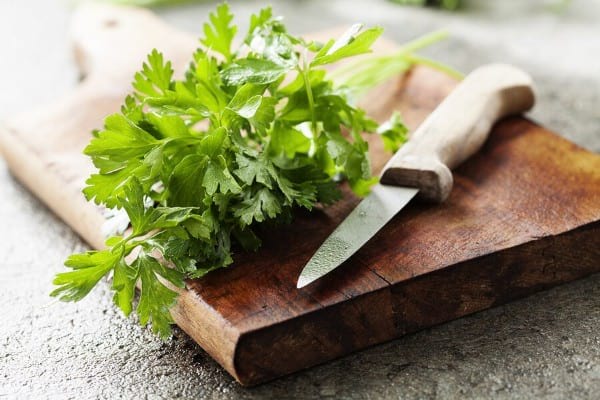
Most leafy greens are fantastic for you, and parsley is no exception. This superfood really fits the definition because it is a concentrated source of nutrition, antioxidants, and more. Plus, it tastes amazing. It is extremely high in vitamin K, and a single half cup of parsley contains upwards of 500% of the daily recommendation.
Parsley also contains vitamin C, vitamin A, some folate (a B vitamin), and iron. It’s high in antioxidants which can reduce free radical damage and oxidative stress markers. It’s even considered a chemo-protective plant due to its properties being able to fight damage to DNA. Like most other herbs, parsley is high in minerals such as calcium.
If you’re feeling bloated, parsley’s anti-inflammatory properties can be helpful. Parsley even acts as a natural diuretic and stimulates the kidney which can help you shed some water weight and reduce bloating. Finally, it is both antibacterial and antifungal; parsley oil is great for the skin because it can fight bacteria and clear blemishes.
6. Chilli
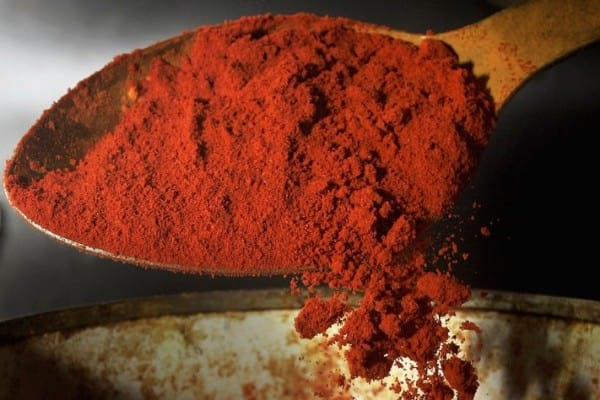
Chilli is one of my favourite ways to spice things up. I love fresh chillis, ground chilli powder, and chilli flakes alike. Many spicy foods have unique health benefits – most notably, weight loss benefits – and chilli is no exception. Since this spice is derived from peppers, you also get many benefits from the veggie itself.
First and foremost, peppers contain even more vitamin C than an orange does. If you want some serious immune-boosting action, chillis are the way to go! In fact, chillis contain up to seven times the amount of vitamin C of an orange. Moreover, chilli contains vitamin A and vitamin E.
The capsaicin found in spices derived from the pepper is particularly beneficial. It helps to inhibit the neuropeptides associated with inflammatory processes that take place in the body, and it may reduce pain in individuals with symptoms from sensory nerve fibre disorders (arthritis, psoriasis, etc.).
You may already be familiar, but capsaicin can also reduce congestion and relieve a stuffy nose. It goes without saying that the spicier the pepper, the more capsaicin a.k.a. the more benefits you reap. If you can handle the heat, it may be worth the sweat.
7. Cumin
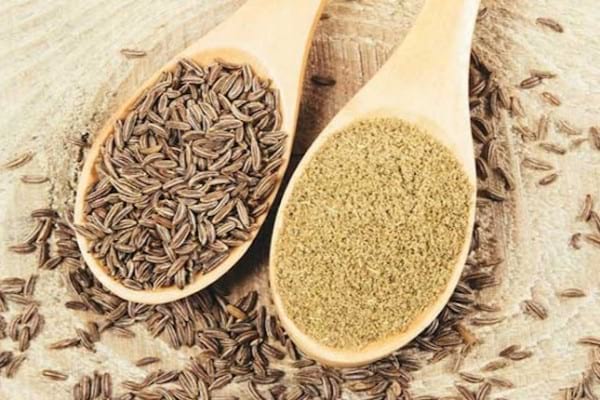
Cumin is a staple seed or ground spice in so many recipes. Its warm and earthy flavour is perfect for deepening the flavour profile of many different types of cuisine. Of course, you know exactly what cumin tastes like if you’re a taco enthusiast (and who doesn’t love tacos?). It tastes great, and it’s great for you.
Cumin is a great seed for digestion. One of its main compounds – thymol – aids in the production of bile, stomach acid, and digestive enzymes. This can improve the efficacy of digestion, naturally, treat haemorrhoids or help prevent them, and reduce the severity of gas. Moreover, some of these benefits can be attributed to the fibre content found in cumin.
Vitamin E which is found in cumin acts as an antioxidant. Vitamin E is particularly good for healthy, glowing skin. It’s also pretty high in vitamin C, so like many spices on my list today, it can be a powerful immune booster. Lastly, cumin is anti-congestive, antiviral, and antibacterial meaning it’s great for warding off infection or clearing up the airways while under respiratory stress.
8. Rosemary
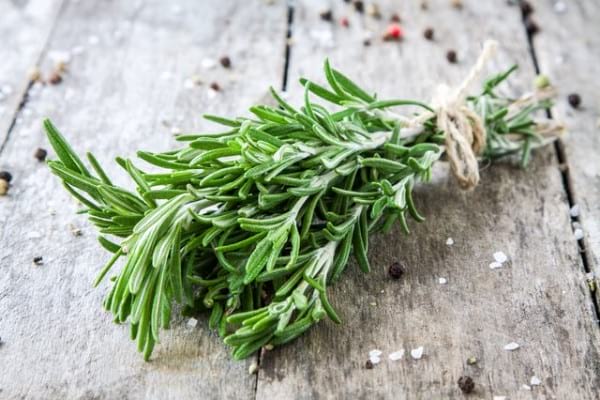
Rosemary is a delightful, aromatic, and healthy herb I always save a spot for in my herb garden. It looks gorgeous, smells gorgeous, tastes great, and even has a few sneaky benefits to boot. In Roman, Greek, and Egyptian culture, it’s regarded as sacred. What’s not to love about this vibrant green plant? You can use it fresh, ground, or in essential oil, form to receive the benefits. However, fresh rosemary will have the most bioavailable nutrient profile.
In terms of vitamins, fresh rosemary contains vitamin A, vitamin B6, vitamin C, and other B vitamins such as folate and thiamin. It’s also high in fibre. In combination with its anti-inflammatory properties, these properties make rosemary a great herb for gut health and digestion. Rosemary may actually increase bile flow which improves digestion overall, and conditions like IBS or Crohn’s disease. You can brew rosemary in a tea to treat an upset stomach or nausea as well.
Rosemary oil – one of my favourite essential oils – is fantastic for skin, hair, and sore spots. It’s a soothing remedy for dryness, dandruff, and healing of cuts and bruises. When using rosemary oil as a topical treatment, make sure to properly dilute any essential oils.
Oh, and did you know that rosemary has long been used as a cognitive booster? Perhaps adding a bit to the diet is the key to a little extra brainpower, focus, and mental clarity. Even just catching a lovely whiff can give me a little more energy!


